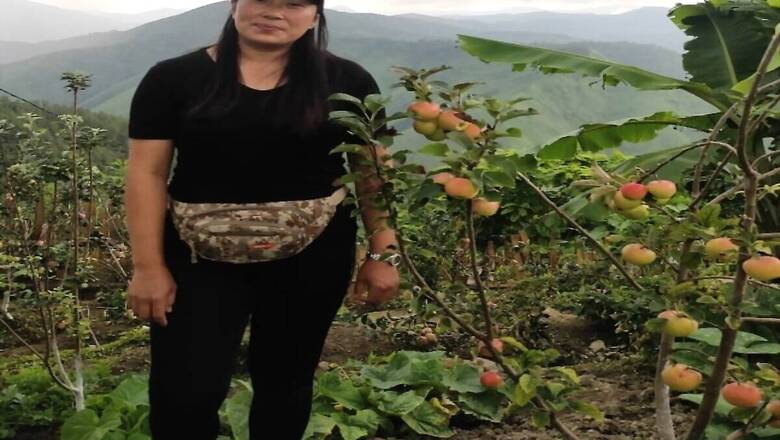
views
Awungshi Shimray Augustina says she has sold around 150 kilograms of sweet and juicy apples from her orchard this year. Another 80 kilograms are still to be picked. This is the first harvest from her orchard that she planted in the first week of April 2019.
“I was working with Gordon Max, a Singapore-based company in Delhi that deals in lab-grown diamonds. I was the manager of the company. In 2018, I decided to return to my native village Poi in Ukhrul along the Indo-Myanmar border of Manipur to help my parents. Avenues for employment are very rare in these remote places so I decided to try my hands at something that people from my region have never thought of. In 2019, I planted 55 saplings of a low-chilling variety of apples that I got from Himachal Pradesh in a small plot of land a few paces away from the house. Amazingly, 52 of them survived and grew abundantly. In 2020, I did not harvest the fruit, and during the pandemic lockdown of 2021, I collected the crop in the second week of June. The apples are red, juicy and sweet,” says Augustina.
For a family of paddy cultivators, Augustina’s decision was not only a bold one but a risky one too. The young woman’s father was initially reluctant. However, her mother was enterprising. She stood by her daughter’s decision to try something noble. After all, a seed hidden in an apple is an invisible orchard.
According to Augustina, it was National Commission for Women (NCW) member Soso Shaiza who sowed the idea of apple plantation in her mind. Shaiza arranged her training at Palampur, Himachal Pradesh. It was here that Augustina learnt about orchard plantation and the high-yield, low-chilling variety of apples.
“These apple trees start bearing fruit from 6 to 12 months. The soil and topography of Ukhrul suited their growth. Until now, I have harvested around 150 kilograms and another 70-80 kilograms are on the trees. Most importantly they are totally organic. Due to the pandemic lockdown and restriction on movement, I sold the produce in the local market. Initially, I thought of pricing them around 250 rupees a kilogram, but I sold them at Rs 200. Friends called up and said that it’s cheap. This is the first year; it’s OK if they are cheap,” says Augustina.
For the people of Pio, apples in their locality was a totally new thing and they couldn’t believe that this was done with a commercial intention. “People tried moving into the orchard and plucking the apples on their own as it is often done in our villages. Some tried stealing them. I had to fence the orchard and put it under lock and key. Fruit cultivation in an organised way for commercial purposes, and that too apples, is an unheard of subject in this part of the world. I shared 20-30 kilograms among friends, neighbours and well-wishers,” says Augustina.
Today, Awungshi Shimray Augustina is a brand ambassador for apple cultivation in Manipur. Like her, a large number of farmers in the state and neighbouring Mizoram have taken to apple farming.
“Married women and young girls come to me, wanting to see the orchard. They show interest in cultivating apples in tier farmland. Some ask for saplings. I have suggested a training course and vowed to order saplings from Himachal. My little orchard definitely seeded a sweet revolution in Ukhrul and more so among the women and young girls,” says Augustina.
There were half-hearted attempts to plant apple trees in the Northeast in the 1990s, but that did not bear any fruit. But ever since 2016, the idea has taken root and many farmers, who earlier grew only rice, pineapple and bananas, have taken to it.
The low-chilling varieties of apples such as Anna, Dorsett Golden, Sun Fuji, etc, do not require long and very low temperatures to grow. Traditional varieties of apples require about a thousand to fifteen hundred hours of chilling. But the low-chilling variety in the Northeast needs just about three hundred to five hundred hours of chilling. These varieties are best suited for the climate of Mizoram and Manipur that is not too cold.
Read all the Latest News, Breaking News and Coronavirus News here.
















Comments
0 comment